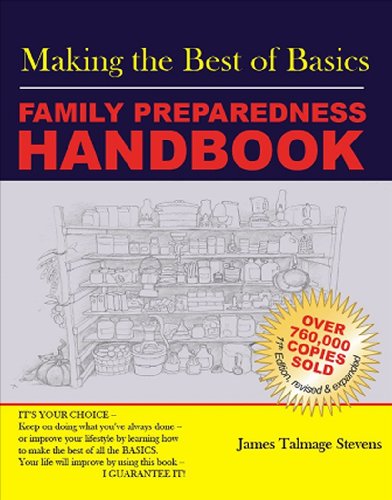Recently by M.D. Creekmore: The Most Likely SHTF Event
Survival Food Storage is one of the most essential elements of emergency planning.
The art and science of food storage involves strategically choosing what you’ll need in the correct amount and storing it properly. With the goal of having it available and palatable when needed in an emergency.
So, whether you're looking to protect your family in an emergency or simply want to save money by buying your foods in bulk, you'll need some information before you start.
10 Steps to Effective Survival Food Storage
This tutorial is designed to get you up and running with the basics of building your pantry in ten easy lessons. Afterward, you'll get recommendations for books and links to other resources. Let’s get started.
-
 Emergency Food Storage...
Best Price: $1.22
Buy New $7.42
(as of 10:35 UTC - Details)
10 Things To Do Now!
Emergency Food Storage...
Best Price: $1.22
Buy New $7.42
(as of 10:35 UTC - Details)
10 Things To Do Now! - Top 10 Smart Ways to Build Your Food Storage
- Comfort Foods
- Food Shelf-Life Recommendations
- Food Storage Prep
- Are You Making This Food Storage Mistake?
- What You Should Know About Food Grade Plastic Buckets
- What You Should Know About Wheat
- Don't Buy a Grain Mill Without Reading This!
- The perfect survival food
Recommended Food Storage Books
- Emergency Food Storage and Survival Handbook by Peggy Layton (food storage and emergency preparedness)
- Cookin' with Home Storage by Vicki Tate (cooking and using basic storage foods)
- Making the Best of Basics – Family Preparedness Handbook by James Talmage Stevens (food storage and prep)
- Crisis Preparedness Handbook: A Comprehensive Guide to Home Storage and Physical Survival
- How to Live on Wheat – The Complete Guide To Selecting, Storing, Preparing and Cooking Wheat and Other Grains
 Making the Best of Bas...
Best Price: $18.22
Buy New $40.00
(as of 10:15 UTC - Details)
Links to Other Resources
Making the Best of Bas...
Best Price: $18.22
Buy New $40.00
(as of 10:15 UTC - Details)
Links to Other Resources
- Food Storage Calculator: Gives a Basic Estimate Of Needed qualities.
- Prudent Food Storage: Questions and Answers
Emergency Food Storage List For One Person For One Year
- 300 pounds wheat
- 100 pounds of legumes
- 100 pounds of other grains (corn, millet, oats, buckwheat, etc.)
- 100 pounds of dried and canned fruits and vegetables
- 50 pounds of dried milk
- 50 pounds of canned or dried meats
- 25 pounds of honey
- 5 pounds of salt
- 25 pounds of oils (coconut and Olive)
- 2 pounds of baking powder
- Multiple vitamin and mineral supplements and extra vitamin C
Have anything to add or advice to share please do so in the comments on my website.
If you enjoyed this post, make sure you subscribe to my RSS feed!
November 6, 2010




